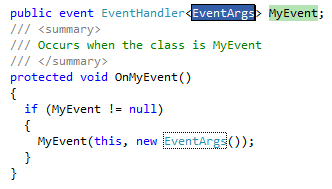Overload operators the right way in C#
It’s a good rule of thumb to overload the equality operators on classes. That ensures a correct comparison between to class instances of the same type. If you don’t, .NET automatically uses reflection and that is way slower than a custom implementation.
We all use the equality operators (“==”, “!=”) all the time and we expect them to be right every time. They are not!, but even if they were there is a good chance that you want to change them anyway. For instance, if your class has a unique Id property, then that property is the one that tells if two instances are the same. If you don’t overload the operators, you could have two instances with the same Id treated as two different instances.
First of all, you have to find out what makes two instances different. Let’s keep using the Id property example in an imaginary class called Foo. Then lets start overriding the GetHashCode() method so it returns the hashcode of the Id property.
/// <summary>
/// A
uniquely key to identify this particullar instance of the class
/// </summary>
/// <returns>A
unique integer value</returns>
public override int GetHashCode()
{
return this.Id.GetHashCode();
}
Whenever the GetHashCode() method is called, it returns a unique integer value that represents the uniqueness of the class instance. Now we can use that method to overload the operators.
/// <summary>
/// Checks
to see if two business objects are the same.
/// </summary>
public static bool operator ==(Foo
first, Foo second)
{
//
Checks if the pointer in memory is the same
if (Object.ReferenceEquals(first,
second))
{
return true;
}
//
Checks for null values
if ((object)first
== null || (object)second
== null)
{
return false;
}
return first.GetHashCode()
== second.GetHashCode();
}
/// <summary>
/// Checks
to see if two business objects are different.
/// </summary>
public static bool operator !=(Foo
first, Foo second)
{
return !(first
== second);
}
The reason why it is necessary to box the two Foo parameters (first, second) to type
object, is to avoid an overflow exception.
We still need one more thing to be sure that we can compare two instances to each
other, and that is by overriding the Equals() method. You can use the Equals() method
or the operators to compare instances and they should always return the same result.
/// <summary>
/// Comapares
this object with another
/// </summary>
/// <param
name="obj">The
object to compare</param>
/// <returns>True
if the two objects as equal</returns>
public override bool Equals(object obj)
{
if (obj == null)
{
return false;
}
if (obj.GetType()
== this.GetType())
{
return obj.GetHashCode()
== this.GetHashCode();
}
return false;
}
You can implement these methods on a base class so you won’t have to write it on all the derived classes. Because these methods uses GetHashCode() to compare two instances, it would be preferable to override that method in the derived classes if needed.
